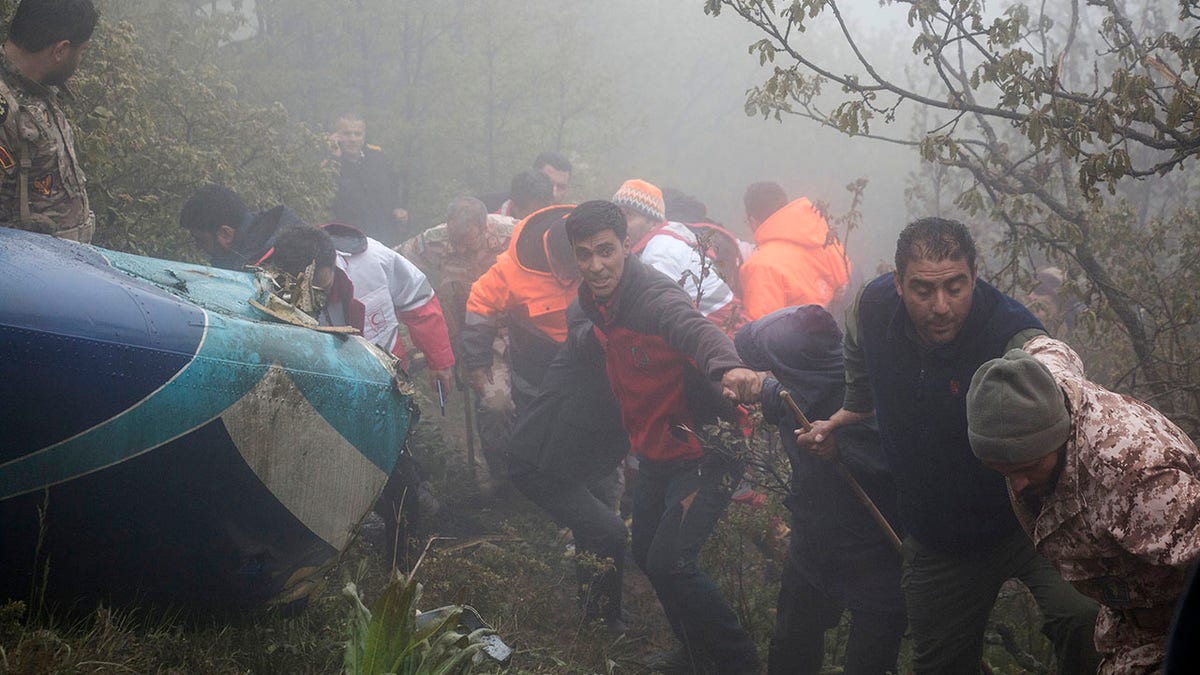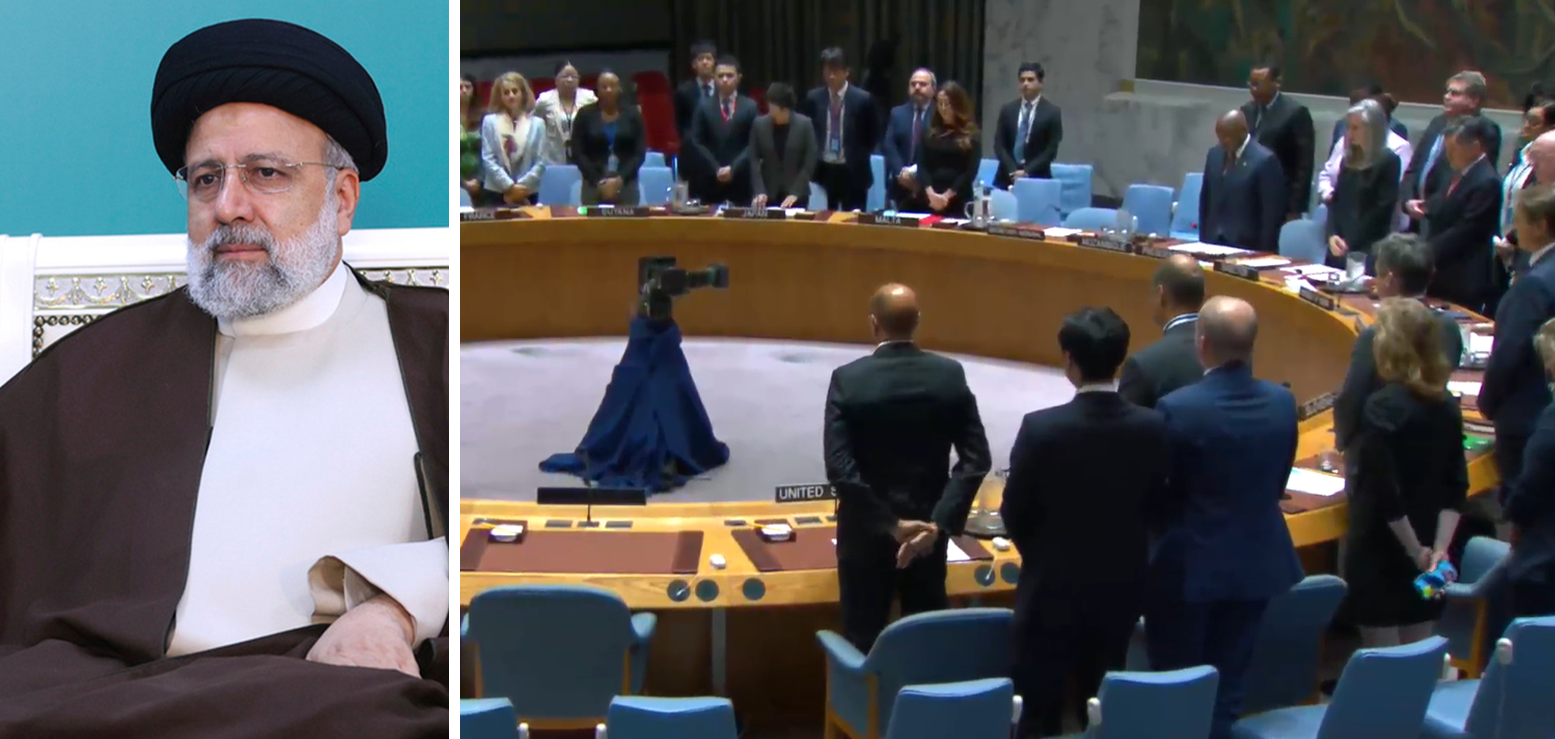Despite earning the nickname the “Butcher of Tehran” for presiding over Iran’s human rights abuses, the United Nations on Monday held a moment of silence for Ebrahim Raisi after the Iranian president died in a helicopter crash.
At the request of Russia, China, and Algeria, representatives – including United States Deputy Ambassador to the U.N. Robert Wood – stood at the U.N. Security Council for a minute to honor Raisi.
Israeli U.N. Ambassador Gilad Erdan called the moment of silence in memory of “mass murdering” Raisi a “disgrace.”
Erdan slammed the U.N. Security Council for doing nothing to advance the release of the remaining hostages who have been in Hamas captivity since the Oct. 7 attack on Israel.
‘BUTCHER OF TEHRAN’ DEAD BUT RAISI’S LEGACY CONTINUES AS IRAN APPOINTS ACTING PRESIDENT
Representatives at the U.N. Security Council hold a moment of silence to mourn the death of Iranian President Ebrahim Raisi. (U.N. )
This Council, Erdan said, “bowed its head for a man responsible for massacring and murdering thousands in Iran, in Israel, and around the globe. What’s next? Will the Council dedicate a moment of silence to commemorate Hitler?”
State Department spokesperson Matt Miller addressed the U.S.’ participation in the moment of silence at an afternoon press briefing.
Asked if the U.S.’ participation was appropriate, Miller clarified that “we have been quite clear that Ebrahim Raisi was a brutal participant in the repression of the Iranian people for nearly four decades.”
Miller pointed to Raisi’s involvement in “numerous horrific human rights abuses, including playing a key role in the extrajudicial killing of thousands of political prisoners in 1988.”

President Ebrahim Raisi attends a meeting with his Azeri counterpart Ilham Aliyev during the inauguration ceremony of dam of Qiz Qalasi, or Castel of Girl in Azeri, at the border of Iran and Azerbaijan, Sunday, May 19, 2024. (Iranian Presidency Office via AP)
“Some of the worst human rights abuses occurred during his tenure as president, especially the human rights abuses against the women and girls of Iran,” Miller said, but qualified: “That said, we regret any loss of life. We don’t want to see anyone die in a helicopter crash. But that doesn’t change the reality of his record, both as a judge and as the president of Iran.”
Behnam Ben Taleblu, an expert on Iranian security at the Foundation for the Defense of Democracies (FDD), criticized both the U.N. and the State Department for self-defeating actions.
“Rather than use this time to push for moral clarity, this muddled approach towards Raisi’s bloody past mistakenly prioritizes diplomatic niceties over reality,” Taleblu said.
A senior adviser to the U.S. Ambassador to the U.N. told Fox News Digital that it “is [the] diplomatic norm to stand for moments of silence in the Security Council and by no means represents any honor or tribute to a man whose repression and brutality the U.S. consistently countered in that very room.”
“Raisi was a brutal participant in the repression of the Iranian people for nearly four decades. He was involved in numerous, horrific human rights abuses, including playing a key role in the extrajudicial killings of thousands of political prisoners in 1988,” the adviser said. “Some of the worst human rights abuses on record, especially against the women and girls of Iran, took place during his tenure.”
Iranian state media confirmed early Monday that President Raisi, along with others, including the country’s foreign minister, Hossein Amirabdollahian, was found dead after an hours-long search through a foggy, mountainous region of the country’s northwest.
LEBANON FOREIGN MINISTER ‘FEELS GREAT LOSS’ OVER DEATH OF IRAN PRESIDENT, OTHER OFFICIALS IN HELICOPTER CRASH

In this photo provided by Moj News Agency, rescue team members work at the scene of a crash of a helicopter carrying Iranian President Ebrahim Raisi in northwestern Iran on Monday, (Azin Haghighi, Moj News Agency via AP)
Raisi was returning via helicopter after traveling to Iran’s border with Azerbaijan to inaugurate a dam with Azerbaijan’s President Ilham Aliyev when the crash happened in the Dizmar forest in East Azerbaijan province.
Raisi was seen as a protégé to Iran’s supreme leader Ayatollah Ali Khamenei and a potential successor for his position within the country’s Shiite theocracy.
But Raisi’s death has also highlighted his human rights record.
In 1988, at the end of Iran’s long war with Iraq, Raisi served on what would become known as “death commissions,” which handed down death sentences for political prisoners, militants and others. International rights groups estimate that as many as 5,000 people were executed.
Raisi has defended his actions, saying at a news conference that he was “proud of being a defender of human rights and of people’s security and comfort as a prosecutor wherever I was.”
Activists abroad, like the New York-based Center for Human Rights in Iran, described Raisi’s presidency as seeing “a stunning escalation of state repression and violence against peaceful dissent in Iran.”
“Raisi presided over a country suffocated by a regime that fears its own people,” said Hadi Ghaemi, the center’s executive director. “He was merely one boot on the necks of the Iranian people; others can easily take his place.”
CLICK HERE TO GET THE FOX NEWS APP
Mass protests swept the country in 2022 after the death of Mahsa Amini, a woman who had been detained over her allegedly loose headscarf, or hijab.
The monthslong security crackdown that followed the demonstrations killed more than 500 people and more than 22,000 others were detained.
The Associated Press contributed to this report.

